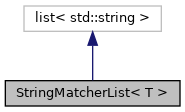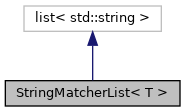Utility for selecting a quantity label Applied by DataSelector.
More...
#include <StringMatcherList.h>
|
|
typedef T | matcher_t |
| |
|
typedef std::list< T > | list_t |
| |
|
|
template<typename ... TT> |
| | StringMatcherList (const TT &... args) |
| | Basic constructor.
|
| |
|
| StringMatcherList (const StringMatcherList< T > &l) |
| | Copy constructor. Copies the list of quantities.
|
| |
|
| StringMatcherList (std::initializer_list< matcher_t > l) |
| |
|
virtual | ~StringMatcherList () |
| | Destructor.
|
| |
|
| operator bool () const |
| | Return true, if at least one matcher key defined.
|
| |
|
StringMatcherList | operator= (const StringMatcherList< matcher_t > &l) |
| | Replace current list with a new one.
|
| |
|
StringMatcherList | operator= (const std::initializer_list< matcher_t > &l) |
| | Replace current list with a new one.
|
| |
|
void | setKeys (const StringMatcherList< matcher_t > &l) |
| | Replace current list with a new one.
|
| |
|
template<class T2 > |
| void | setKeys (const std::initializer_list< T2 > &l) |
| | Replace current list with a new one.
|
| |
|
template<class T2 > |
| void | setKeys (const std::list< T2 > &l) |
| | Replace current list with a new one.
|
| |
| template<typename ... TT> |
| void | setKeys (const std::string &arg, const TT &... args) |
| | Define the list of accepted quantities.
|
| |
|
template<typename ... TT> |
| void | addKey (const matcher_t &arg, const TT &... args) |
| | Append keys to existing list.matcher_t.
|
| |
| bool | test (const std::string &key, bool defaultResult=true) const |
| | Check if key is accepted.
|
| |
|
const matcher_t & | retrieve (const std::string &key) const |
| |
|
bool | isSet () const |
| |
|
const list_t & | getList () const |
| |
|
void | toStream (std::ostream &ostr) const |
| |
|
| void | insertKeys (const std::string &args) |
| | Define the list of accepted quantities as a string.
|
| |
|
void | addKey () |
| |
| void | adaptKey (const matcher_t &s) |
| |
template<class T = std::string>
class drain::StringMatcherList< T >
Utility for selecting a quantity label Applied by DataSelector.
◆ adaptKey()
template<class T >
| void adaptKey |
( |
const matcher_t & |
matcher | ) |
|
|
protected |
In future, the recommended way to define desired/accepted quantities is a comma-separated list of keys.
◆ insertKeys()
template<class T >
| void insertKeys |
( |
const std::string & |
args | ) |
|
|
protected |
Define the list of accepted quantities as a string.
- Parameters
-
| args | - comma-separated list of quantities: literals or regexps. |
| separators | - can be also ",:" and contain ':' if that is not used in the regexps. |
◆ setKeys()
template<class T = std::string>
template<typename ... TT>
| void setKeys |
( |
const std::string & |
arg, |
|
|
const TT &... |
args |
|
) |
| |
|
inline |
Define the list of accepted quantities.
- Parameters
-
| arg | - this first arg can be also a comma-separated list of quantities - literals or regExps. |
| args | - separate list of quantities - literals or regExps. |
◆ test()
template<class T >
| bool test |
( |
const std::string & |
key, |
|
|
bool |
defaultResult = true |
|
) |
| const |
Check if key is accepted.
- Parameters
-
| key | - string to be checked. |
| defaultResult | - if selector (list) is empty, return this value. |
The documentation for this class was generated from the following file:




 1.9.8
1.9.8